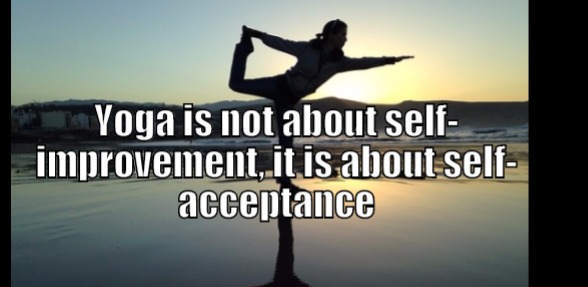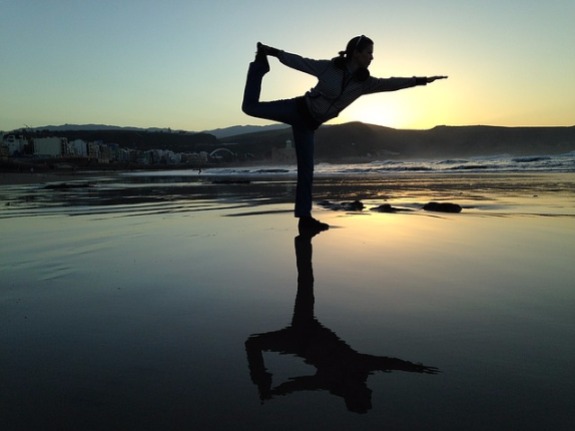Physical Benefits of Yoga

Physical Benefits of Yoga
In the Indian sub-continent, yoga embraces a complete methodology of life. We call it ‘lifestyle’. It pays to take into account its extensive and rich history, which dates back to the 3rd millennium B.C. Yoga is a complete philosophical approach to living and not just a physical exercise regime as it is mistaken by many. That said, there is no harm in exploring the physical benefits of yoga before diving into the mental and spiritual benefits of yoga.
 Historically speaking, when one practiced yoga this involved meditative exercises, a mostly vegetarian type diet. Ultimately every aspect of the practitioners practice had the supreme goal of achieving enlightenment.
Historically speaking, when one practiced yoga this involved meditative exercises, a mostly vegetarian type diet. Ultimately every aspect of the practitioners practice had the supreme goal of achieving enlightenment.
In the Western World, yoga became popular in the 1960’s, through the establishment of a vast number of neo-Hinduistic philosophical schools. However from the 1980’s, the physical benefits of yoga became more entrenched as an independent form of exercise or fitness regime, which could be followed irrespective of its origins, philosophies or mental aspects.
Yoga practitioners throughout the world currently number in the tens of millions.
Let’s look at how yoga can benefit the physical body in some areas in a little more depth
Mobility Benefits of Yoga
A common result of our rather sedentary lifestyles is a lack of mobility on a grand scale. Sadly, this applies across all age brackets. Humans were not created to sit for endless hours, in a normally slovenly posture in front of a computer or TV screen. Technology along with its great strides most definitely has a darker and less appealing side, especially in relation to the human body. For many people, birth defects and the natural aging cycle also bring with them in some cases a decrease in mobility of various natures.
Can yoga provide physical benefits?
 The body is a complex structure held together by muscle and ligament. The simple process of stretching muscles and ligaments helps the body work better for longer. Yoga is a process of stretching and holding poses. As such yoga can and does help to achieve both flexibility and mobility. Sometimes even more importantly it will assist and increase range of movement. This is particularly helpful to the disabled, the infirm or those in their ‘Golden Years’.
The body is a complex structure held together by muscle and ligament. The simple process of stretching muscles and ligaments helps the body work better for longer. Yoga is a process of stretching and holding poses. As such yoga can and does help to achieve both flexibility and mobility. Sometimes even more importantly it will assist and increase range of movement. This is particularly helpful to the disabled, the infirm or those in their ‘Golden Years’.
From a more general view, the improved spinal alignment and posture brought about by the practice of poses and postures, helps greatly to relieve back, neck and joint problems, which are very common today.
It should be remembered that all forms of yoga will help to increase mobility, the starting point being irrelevant.
‘Bikram Yoga would be a consideration for the population at large, with ‘Restorative Yoga’ and ‘Chair Yoga’ being splendid choices for those who are recuperating or are of advanced years.
The Brain
‘The Brain’, is the most fascinating and somewhat mysterious and baffling organ in the body of man.
Many wonder how doing somewhat strange and elaborate poses, (baffling animalistic names aside), can make one ‘function’ better, decrease pain or alleviate stress, as if by magic – in fact it is not magic, it is quite simply neurobiology.
“What is neurobiology?” It is the things you do and the thoughts you have. By changing either of these, the firing patterns and chemical composition of the brain change too. Change them in a positive direction adn the brain functions better in a positive direction too.
One of the fundamental principles of yoga is to retrain the brain to stop automatically evoking a stress response (fight or flight syndrome) in favour of a more calm response.
Any practice that is able to reduce stress and anxiety will improve cognitive performance across the board. This is of great benefit to all and is somewhat unique in the greater arena of exercise where most of the emphasis is on physical performance alone.
A good starting point to encompass both physical and mental benefit of yoga would be ’Hatha Yoga’ or for the more spiritually inclined ‘Raja Yoga’ might possibly prove to be of interest.
Pain Relief
Yoga is said to heal many aches and pains through creating fluid movement and meditation.
“It’s all in your mind”, must be one of the most annoying and frustrating sentences that one can utter to somebody who is enduring pain or even the more debilitating ‘chronic pain’.
There are most definitely the obvious causes of pain e.g. the open flame on a hand, a torn tendon, a broken hand or leg etc.
More recently however research points to a second more subtle source of pain (and in particular chronic pain), which is the biology of your thoughts, emotions, expectations and memories.
“Does past pain make you more sensitive to future pain? – Sadly, yes it does”, and this ability is call neuroplasticity, so in other words ‘ learning from experience’ paradoxically means more pain, not less.
Chronic pain-and-stress responses need to be transformed into ‘chronic healing responses’ of the mind and body.
Meditation, relaxation poses, or perhaps a finely attuned breathing exercise, all help to put the mind at ease and with that comes the strengthening of energy flow or ‘chi’ in the entire body.
Relaxation specifically turns off the stress response and directs the now ‘freed up’ and available energy of the body to growth, repair and immune function.
Following the path of yoga and practicing a style which resonates with you and your lifestyle personally, will in essence teach you how to focus you mind to change your ‘experience’ and response to pain.
It follows on, that once that is achieved, you gain control back, a feeling of safety emerges and courage comes racing back, allowing you to once again master your life, to the very best of your ability.
Other Benefits of Yoga
Some other general physical benefits of yoga would include amongst others:
- Focus and concentration
- Promotion of self-healing
- Increased vitality
- Improved muscle strength and body tone
- Better balance and co-ordination
- Enhanced respiration
A final word:-
“Yoga is not about self-improvement, it is about self-acceptance”.
And remember
“Compassion is a verb” – Thic Nhat Hanh
Be kind to yourself …. You are doing the best that you can do.